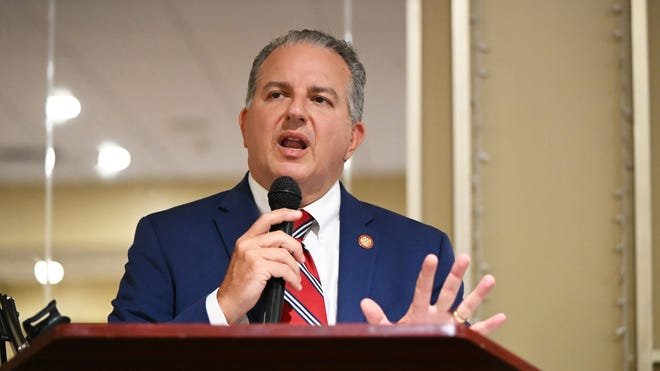VENICE – Florida Chief Financial Officer Jimmy Patronis told members of South County Tiger Bay recently that insurance rate relief is coming but a key to seeking that relief is to follow the steps outlined in the My Safe Florida Home Program to improve the integrity of one’s home in the event of a hurricane.
Those thoughts may take on added relevance for area homeowners after of this region’s brush with Hurricane Debby, which dumped a historic level of rainfall on north Sarasota County as it passed in the Gulf as a tropical storm on Sunday and early Monday. The storm intensified before making landfall in north Florida.
The My Safe Florida Home Program – which started in 2006 and was later brought back in 2022 – provides homeowners a wind-mitigation survey and up to $10,000 in grant funds to fortify homes against storms – what Patronis referred to as protecting “the bubble.”
About $185 million was earmarked for the program by the Florida Legislature this year.
The most recent round of grant funds allotted this year have been awarded but Patronis stressed that savings generated by that hurricane hardening can be considerable.
“The more you protect the bubble – and call your house a bubble – the more impenetrable that bubble is when a new storm comes knocking at your door,” Patronis said.
Once those upgrades are made by program-approved contractors and documented, insurance companies must, by state law, lower a homeowner’s insurance premium.
How My Safe Florida Home can work
To illustrate the impact of that process Patronis – who did not apply for a My Safe Florida Home grant but did follow the steps – used his own experience following 2022’s Hurricane Ian, which generated 775,000 insurance claims, with insurers paying out roughly $21 million.
In an 18-month period Patronis said he saw his premium skyrocket from $2,300 to $9,500 a year.

After receiving his windstorm mitigation Patronis said he ordered hurricane windows in May 2023 that were installed that summer.
His bill peaked that Novembera at $9,500, after which he installed hurricane doors, and had his roof inspected for compliance.
Those changes were documented in a new inspection on Dec. 28, 2023.
On Jan. 22 of this year, Patronis said his carrier sent him a check for $4,500, reflecting a reduction of his new rate to $5,000 a year.
“And those improvements are mine forever,” Patronis said at the Tiger Bay event July 31.
A My Safe Florida Home pilot project for condominium owners will start later this year with a $30 million pool of grant funds.
Program funds generated by hurricane repair sales
As Patronis explained it, the My Safe Florida Home program is funded by revenue generated from sales tax collected through sales related to hurricane repairs.
He said Hurricane Ian generated $1.55 billion in “non-expected revenue,” through purchases related to Hurricane Ian recovery.
“We don’t budget for storm money but I feel we’re morally obligated to return that money back to the citizens of Florida; that’s pain and suffering money,” Patronis said “People were hurting because of that storm.”
Since the program was brought back in 2022, Patronis said almost $650 million in grants were given to homeowners seeking to harden their homes,
The sales tax exemptions on storm windows and doors is offset by hurricane sales-related collections, too.
Patronis was at the South County Tiger Bay Club meeting last week prior to attending a fundraiser for Danny Nix, the Republican candidate for the State House District 75 seat once held by House Majority Leader Michael Grant.

Related:Why are Insurance premiums in Florida rising faster than anywhere in the country?
Patronis also lauded the impact of laws enacted in recent years by the Legislature to curb claims inflated by unscrupulous people after disasters.
He highlighted the Citizens Insurance case against Coral Gables attorney Scott Strems in what Citizens characterized as fraudulent claims based on inflated appraisals brought to him by “friendly” public adjusters.
The 2020 case, which involved 5,000 claims dating back to 2014, was ultimately settled in May, 2022 for $ 1 million, according to a Citizens news release.
Strems was ultimately disbarred by the Florida Supreme Court in December 2022.
“With that settlement they blew up his business model,” Patronis said.



